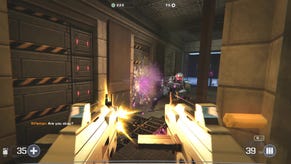Wot I Think: Mainlining
Complain-lining
As has been seen, I love to hack the planet. Intrigue, silliness, typing long commands with a single semi-colon in the wrong place – a good hacking game is always welcome on my PC. Mainlining [official site] is a hacking game that could have been good. But after many frustrations, it’s getting clicked and dragged to the recycle bin. I’ll tell you why.
First I ought to say there’s much to like about it. Even at first sight, it’s the right kind of good-lookin’. Pixel art of the Windows XP era, with thinly-veiled homages of all the operating systems and programs of today jammed in – SkyBox, Rainbows, GPP.
It doesn’t take itself very seriously, which is where a game about government surveillance would be tempted to go. On paper, it's a nice counterpoint to Orwell, the other click and arrest game. They both have a similar aim as the player, anyway. Here, as a member of "MI7", you peep around in files, folders, websites, online profiles, bank statements and the like, trying to find incriminating evidence on a target or targets. You submit your evidence, along with the suspect’s location, to an ‘arrest system’. If you’ve got the right piece of evidence, the right person and the right place – bang, they get locked up and it’s on to the next day’s case file.
Like I say, it’s got a humourous undertone. Your suspects and any incidental associates will often have silly details on their machines. One father writes My Little Pony fan fiction. A spy’s voice-to-text program always mangles his words. At one point, a web design team sends a picture of their work on a client’s website, a monstrous 90s-looking Geocities-styled web page with spinning GIFs and flashing colours. When the client complains, the web design team respond by saying “this is the future”. Meanwhile their own website is filed with odious and undeserved self-promotion. “Some people call it arrogance," they write. "We call it BEING THE BEST.”
Small details like this make the characters fun to observe. And it’s great to see previous information conflicting with new revelations about someone’s personality. Your secretary, a neurotic and inappropriately flirtatious character, tells you at one point that a co-worker “steals my yoghurt from the fridge” and “could be capable of anything”. But when given the chance to creep among the offenders files, you only find her complaining about how people leave things in the fridge to go off and stink it out, and it’s always her who cleans it out. Other characters write bad screenplays, others write letters to TV producers.
But the playfulness of its characters can’t make up for the confusion of both story and puzzles (if the collating of information can be called a puzzle). While the content of messages can be funny, much of the story makes little sense. Files that seem to belong to one person are on another person’s computer without any explanation or reason. Personal chats are visible as blog posts. One mission has a special agent impersonating a member of a hacker group to meet another hacker called Kim and you follow their meeting on the Maps program. Great work! Except that the member your agent is impersonating was arrested two days ago, and it was very publicly mentioned in the newspaper, and there is also a photo of him meeting members of the collective so they definitely know what he looks like. This is a pretty gaping plot hole, and it isn’t the only one.
Much of inconsistencies come in the form of the arrest system. Whenever you submit the three pieces of information – suspect, location, and evidence - a newspaper clipping whooshes in, EXTRA EXTRA style, showing the result. But often the newspaper report and what you’ve submitted to the system don’t match up at all – you might attach an email as evidence proving a person is committing extortion, but the newspaper will report they’re sentenced for drug dealing. This might also be true, because it’s what the story is about – a group of Silk Road type criminals selling drugs online. But the evidence you’re submitting is often at odds with the actual charge and this just makes things more confusing than they have to be.
This isn’t the only frustration with the arrest system, there’ll often be multiple documents that could easily be classed as incriminating, so which one do you use? In reality, you would probably just attach them all and let the lawyers do their jobs. Not in Mainlining. If you don’t have exactly the thing it wants, you’ve got the wrong combo. The suspect’s location also has to be correct – but is this their home address or current location? This is a question that’s never answered and you’re left to discover that it’s their current location, which you’ll have to divine from whatever messages and memos you’ve stumbled upon. In this reality, you cannot simply ask for an arrest warrant and wait until the perp is at home in bed at 5am, which is how almost all cyber criminals are actually arrested.
For a game about being a cyber detective, much of it is counter-intuitive, filled with terrible spycraft. When you get the evidence or location wrong but the person right, the newspaper says “Haha! MI7 embarrassed! This person was wrongly arrested!” But after that you just keep trying all the other documents or possible locations until you hit the right combo. I have on multiple occasions arrested the same suspect three or four times until only the final charge stuck. Report after report in the paper calls us out on it, but ultimately nobody seems to care that MI7 is a bumbling den of morons. You just get to keep trying.
This is just part of its lack of consistency in its own internal rules and story. There are annoying things left unexplained or badly explained. I'll give you one example of a tiny but important miscommunication. At one point, it’s suggested that you have to access a bank – Barlowes Bank. At the bottom of the Barlowes website it says “for account info visit barlowes/account number, eg. barlowes/12345678.” I looked at this and thought: “What does that mean? There must be a form I have to fill with those fields or something” I spent the next hour trying other avenues and desperately trying to find some help online (the real online) without success.
It turns out the little message means to type it into your in-game internet browser, like a website. All websites in the game have a “.bp” extension. So why the example message and necessary website was not “barlowes.bp/12345678” I have no idea. Three little characters were missing and it threw me further off-course than a sunken golf ball. This incredible frustration repeated itself when an IP address had a typo in it and when one bank account simply didn’t appear to exist, despite quintuple checking I had entered the account number correctly. All these small mistakes and oversights start to add up.
The bank debacle was part of the seventh mission, in which you get a list of MI7 employees to investigate. To begin it’s the most fun mission so far – an internal investigation that is showing both funny messages or mundane diary entries in the records of innocent parties and more story-focused stuff in others. But before long it became a frustrating mess, the point where I had to give up. Investigating one character leads you down a path that begins fruitfully but seems to cut off without any clear direction or suggestion. His actions and records also don’t correspond to the thing you’re looking for – a murder suspect.
My central complaint is that it is never clear what the game WANTS you to do, and if you try to do what you want to do, it simply tells you that you are wrong, try again. This is a reminder that the trailer’s claims of “follow anyone, track anyone” are bogus. You can follow the set people the mission gives you an IP address for. The rest of the world just resides in a giant database which you can look at but serves no other function until you want to arrest your predetermined target(s). The trailer’s tagline should be corrected to read: “Follow these five people, arrest the wrong one three times”.
While thinking about these frustrations, I understood how to explain it. The arrest system does not fit with the linear story and its finer details. It’s also a pain in the ass to use, the hacking game equivalent of those annoying puzzles in old point and clicks that have you combining paperclips with hairdryers with nail polish with sewer manholes with light switches, and on and on until you find the right ridiculous solution. If either this system had been rethought to be more open-ended, or if the story had fewer inconsistencies, and less of a hard-to-follow jumble of characters with criss-crossing paths, Mainlining could have been a good, comedic antidote to Orwell’s overt political warnings. As it turns out, it’s got as many flaws as an outdated Windows operating system.
Mainlining is out now on Windows via Steam and Humble for £7/$10/€10.


















